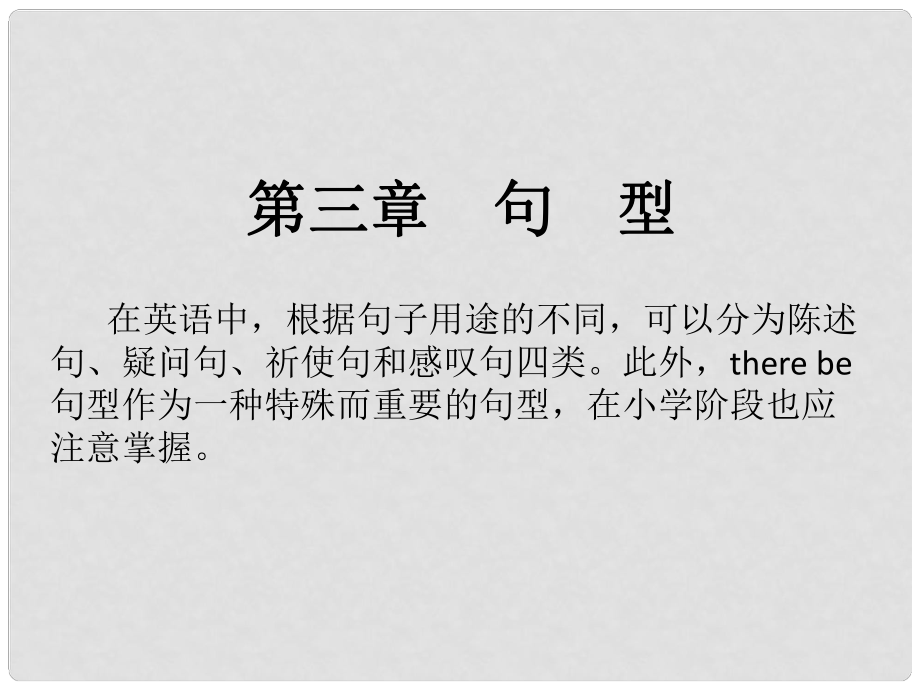《小升初英語(yǔ)總復(fù)習(xí) 第三章 句型 第一節(jié) 陳述句課件》由會(huì)員分享���,可在線閱讀�,更多相關(guān)《小升初英語(yǔ)總復(fù)習(xí) 第三章 句型 第一節(jié) 陳述句課件(19頁(yè)珍藏版)》請(qǐng)?jiān)谘b配圖網(wǎng)上搜索����。
1�、第三章第三章 句句 型型 在英語(yǔ)中����,根據(jù)句子用途的不同,可以分為陳述句����、疑問句���、祈使句和感嘆句四類����。此外���,there be句型作為一種特殊而重要的句型���,在小學(xué)階段也應(yīng)注意掌握。知識(shí)梳理知識(shí)梳理一�、陳述句的概念陳述句是用來陳述事實(shí)或者說話人的看法的句子。它包括肯定句和否定句兩種�。在書寫時(shí)句末用句點(diǎn),在朗讀時(shí)用降調(diào)���。如:This is a nice book. ( ) Susan likes maths very much. ( ) My father doesnt go to work on weekends. ( ) They arent going to climb the mountain
2����、 this Saturday. ( )第一節(jié)第一節(jié) 陳述句陳述句 二、肯定句變否定句的基本方法1. 句中有be動(dòng)詞的句子:變?yōu)榉穸ň鋾r(shí)只需在be動(dòng)詞后加not�。如:(1)I am in Grade Six this year. Im not(I am not) in Grade Six this year.(2)Mike is going to play football this afternoon. Mike isnt(is not) going to play football this afternoon. (3) These are red apples. These arent(a
3、re not) red apples. (4) It was a fine day yesterday. It wasnt(was not) a fine day yesterday. (5) We were happy at that time. We werent(were not) happy at that time. 2. 句中含有情態(tài)動(dòng)詞的句子:變?yōu)榉穸ň鋾r(shí)只需在情態(tài)動(dòng)詞后加 not�。 如:(1) Peter can fly. Peter cant(can not) fly. (2) You should stop smoking now. You shouldnt(should
4、not) stop smoking now. 3. 實(shí)義動(dòng)詞的否定句:謂語(yǔ)動(dòng)詞為行為動(dòng)詞的句子變?yōu)榉穸ň鋾r(shí)���,要根據(jù)時(shí)態(tài)選用do的相應(yīng)形式(do, does, did)���,并在其后加 not。 如:(1)I like listening to music. I dont like listening to music. (2)My father likes playing sports. My father doesnt like playing sports. (3) Grandma does housework every day. Grandma doesnt do housework ev
5����、ery day. (4) He did his homework last night. He didnt do his homework last night.【注】加do not, does not或did not改為否定句以后,要把原句的動(dòng)詞改為動(dòng)詞原形����,特別是當(dāng)原句中的謂語(yǔ)動(dòng)詞是第三人稱單數(shù)形式does或過去式did時(shí),改為否定句一定要記得在doesnt或didnt之后加上do���。 4. 幾種特殊形式的否定句 (1) 肯定句中含有every的合成詞時(shí)�,變?yōu)榉穸ň鋾r(shí)將其改為no的合成詞。 如:Everything is ready Nothing is ready (2) 肯定句中含有al
6����、ways,usually或ever時(shí)����,變?yōu)榉穸ň鋾r(shí)將其改為never。 如:He is always late for school He is never late for school I usually go to the park on foot. I never go to the park on foot. (3) 肯定句中含有many或much時(shí)����,變?yōu)榉穸ň鋾r(shí)將其改為few或little�。 如:Many students know him Few students know him There is much milk in the bottle. There is little
7、 milk in the bottle. (4) 肯定句中含有both�,both and 或all時(shí),變?yōu)榉穸ň鋾r(shí)將其改為neither�,neither nor 或none,并注意謂語(yǔ)動(dòng)詞要相應(yīng)變化�。 如:Both of us are students Neither of us is a student Both you and I are right. Neither you nor I am right. All the students are in the classroom. None of the students is in the classroom. (5)“I think
8、 ”句式變?yōu)榉穸ň鋾r(shí)����,只要在think之前加 dont 即可。 如:I think you are right. I dont think you are right.考點(diǎn)精析考點(diǎn)精析考點(diǎn)考點(diǎn)1 考查陳述句基礎(chǔ)句型的運(yùn)用能力考查陳述句基礎(chǔ)句型的運(yùn)用能力【例1】根據(jù)圖片將句子補(bǔ)充完整,每空一詞���。 1.This ruler is _.2.They _ _ _ . 解析:本題考查學(xué)生對(duì)陳述句基本句型的運(yùn)用能力����。第1小題的句子形式是:主語(yǔ)+系動(dòng)詞+表語(yǔ)����。因此,橫線上需要填上一個(gè)單詞或短語(yǔ)對(duì)主語(yǔ)進(jìn)行修飾或限定����。第2題只給出了主語(yǔ)They,只要能根據(jù)圖片內(nèi)容寫出符合圖意的句子,并保證句子語(yǔ)句通順和語(yǔ)法正確
9�、就可以了。答案:1. long2. like playing football / are playing football 舉一反三 1. 改錯(cuò)����,選出錯(cuò)誤項(xiàng)的字母編號(hào)并改正在后面的橫線上。 ( )(1)My brother is playing piano. A B C ( )(2)Some boys comes in happily. A B C ( )(3)Its going to warm tomorrow. A B C CBBplaying the pianocome inbe warm 2. 用括號(hào)內(nèi)所給動(dòng)詞的適當(dāng)填空���。 (1) There _ some bags in the r
10���、oom. The black one _ mine. (be) (2) A horse _ run, but it _ fly. (can) (3) David always _ his homework at 7:00 p. m.(do) (4) Look, the fish _ in the water. They are so cute.(swim)areiscancantdoesare swimming考點(diǎn)2 考查陳述句的句式轉(zhuǎn)換考查陳述句的句式轉(zhuǎn)換【例2】按要求轉(zhuǎn)換句型。1. Today is a rainy day. (改為否定句)2. He does sports three t
11、imes a week. (改為否定句)解析:本題考查肯定句和否定句的轉(zhuǎn)換����,要注意轉(zhuǎn)換規(guī)則。第1小題中有be動(dòng)詞 is����,則只需要在is之后加上not 即可;第2小題中沒有be 動(dòng)詞���,而是行為動(dòng)詞do的三單形式does����,在改寫否定句的時(shí)候���,要先加上doesnt, 然后再將原來的does 還原為do,放在does之后,這種題是最容易出錯(cuò)的���。答案: 1. Today isnt a rainy day. 2. He doesnt do sports three times a week.舉一反三根據(jù)括號(hào)內(nèi)動(dòng)詞的提示���,將下列句子改為否定句。1.Sarah_ (can)swim.2.I _ (do) wa
12���、nt to eat more candies.3.A tiger _ (can) fly,but it can jump.4.You _ (should) put on your jacket.5.You_ (must) smoke here.6.It_ (was)rainy yesterday.cantdontcantshouldntmustntwasnt過關(guān)檢測(cè)過關(guān)檢測(cè)1. 單項(xiàng)填空�。( )1. My father_ like apples. A isnt B. doesnt C dont( )2. I _ like pop music. A isnt B. doesnt C dont(
13、)3. I _go to school yesterday. A do B dont C didnt( )4. Whats this? _ a book. AThat is B Its C This ( )5. I _ many birthday presents. Aam B has ChaveBCCBC( )6. My mother _ badminton well. Ais play Bplay Cplays( )7. I _ free last Sunday. Aam B did Cwas( )8. The girl reads _. Aloud B loudly Cloudy( )9
14�、. My mother would like _ some meat. Abuy B buying Cto buy( )10. Here is a card _ your father. Ain B from CtoCCBCB二、將下列句子改為否定句���,每空一詞�。1. This is a desk. This _ a desk. 2. My sister can draw pictures. My sister _ draw pictures.3. We do morning exercises every day We _ _ morning exercises every day4. Mik
15����、e does his homework after dinner. Mike _ _his homework after dinner. 5. My grandparents did sports in the garden yesterday. My grandparents _ _ sports in the garden yesterday.isntcantdontdodoesntdodidntdo6 There is something wrong with my bike There _ _ / _ _ wrong with my bike7 Both Joan and I are
16、in Class One. _ Joan _ I _ in Class One8 All of us can swim _ _ _ can swim9 You can play basketball here. You _ play basketball here10 I think it is going to rain tomorrow I _ _ _ going to rain tomorrowisntanythingisnothingNeithernoramNoneofuscantdontthinkits三�、按要求改寫下列句子。 1.This is a banana.(改為復(fù)數(shù)形式)
17����、_ 2.There are some apples on the desk.(改為否定句) _ 3.I feel bad last night.(改為同義句) _ 4.Im going to Beijing next week.(改為一般疑問句,并作肯定回答) _ _These are bananas.There arent any apples on the desk.I didnt feel well last night.Are you going to Beijing next week?Yes, I am.四����、連詞成句。 1. sisters���,my����,shorter,hair���,is���,m
18、ine���,than (.) _ 2. should���,you,read���,loudly�,English (.) _ 3. there���,some,noodles���,are�,the,an�,egg,and�, on,plate (.) _ 4. yesterday���,feel����,didnt����,well,I (.) _ 5. in����,at,the����,six,I�,up,morning�,usually����,get (.) _My sisters hair is shorter than mine. You should read English loudly.There are some noodles and an egg on the plate.I didnt feel well yesterday.I usually get up at six in the morning.
 小升初英語(yǔ)總復(fù)習(xí) 第三章 句型 第一節(jié) 陳述句課件
小升初英語(yǔ)總復(fù)習(xí) 第三章 句型 第一節(jié) 陳述句課件

